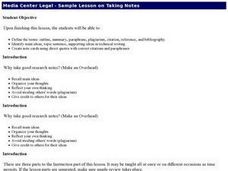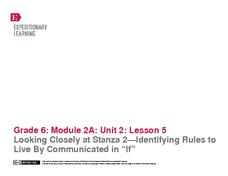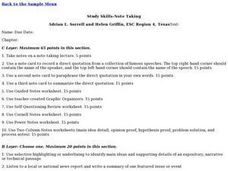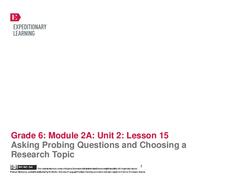Curated OER
Note-Taking: K.I.S.S. "Keep It Short and Simple"
Note-taking is an essential study skill, and it needs to be taught! In the context of a research project on energy sources, learners find multiple sources, evaluating, paraphrasing, and citing them correctly. Two lists with note-taking...
EngageNY
Listening Closely and Taking Notes: Colonial Trade Podcast About the Wheelwright
Voices from the past. Young scholars listen to a podcast interview with a historical re-enactor as they continue their research in the eleventh instructional activity of this unit on colonial trade. Applying their close reading skills,...
EngageNY
Listening Closely and Taking Notes in Expert Groups: Colonial Trade Podcast
The twelfth instructional activity of this unit builds on the skills developed in the previous instructional activity, as fourth graders continue their quest to become experts on colonial trade by listening to interviews with historical...
Curated OER
Listening To a Guest Speaker
Pupils review the main points of note-taking to summarize the content of a formal or informal spoken presentation. They hear a guest speaker talk about a pre-arranged topic and take notes during the presentation. Next, they write a...
EngageNY
Mid-Unit Assessment: On-Demand Note-Taking, Analysis, and Reflection: “Should We Drill?”
Pupils take a mid-unit assessment, completing a point of view graphic organizer based on an informational article about offshore drilling. Next, learners answer text-dependent and short-answer questions about the text.
EngageNY
Taking Notes and Citing Quotes from Text: Gathering Information on our Rainforest Insects
In other words. Scholars practice using paraphrasing and quotes. They partner in pairs to write a paraphrase for an information text strip. Individuals then use their skills to paraphrase information from the text Fire Ants.
EngageNY
Mid-Unit 3 Assessment: On-Demand Note-Taking about Howler Monkeys
Get the facts straight. Scholars complete their mid-unit assessment by reading a text, watching a video, and observing a picture about howler monkeys. They take notes about the facts they discover to use in future lessons.
Lake Middle School
Cornell Notetaking
The beauty of this colorful presentation about Cornell notes is that it begins with a very powerful statistic: "Those who take organized notes and do something with them remember 90-100% of the material indefinitely!" Zounds! Now there's...
EngageNY
Research: Paraphrasing Relevant Information
Readers take a look at the source Ethical Style: How Is My T-Shirt Made? and discuss how to say the information in the article without plagiarism. Learners make note of and underline sentences that may present a problem in paraphrasing....
EngageNY
Paraphrasing Quotes and Analyzing Visual Elements, Part 3: Investigating the Scientific Method with Max Axiom Super Scientist
Come again? Scholars repeat actions taken in the last two lessons using section 3 of Investigating the Scientific Method with Max Axiom Super Scientist. They first read the section to determine the gist and then carry out a second read...
Curated OER
In-Text Citation
Wow! Here's a comprehensive look at the world of plagiarism. Types of plagiarism are defined, examples are shown, and in-text examples are highlighted. Being 75 slides long, this presentation is slightly overwhelming. Consider dividing...
Curated OER
Sample Lesson on Taking Notes
Have your middle schoolers define the terms outline, summary, paraphrase, plagiarism, citation, reference, and bibliography. They identify the main ideas, topic sentence, supporting ideas in technical writing and create note cards using...
EngageNY
Looking Closely at Stanza 2—Identifying Rules to Live By Communicated in “If”
Pupils take part in a close reading of the poem, If by Rudyard Kipling, in which they delve deep into its meaning and identify its rules to live by. As the grand discussion progresses, learners then relate the poem's rules with those...
EngageNY
End of Unit 2 Assessment: Working with Two Texts - Reading, Listening, Summarizing, and Synthesizing
As a summative assessment for this unit on colonial trade, fourth graders listen to and read informational texts in order to demonstrate their ability to take notes, write summaries, and draw connections. Young scholars first listen as...
EngageNY
Mid-Unit 3 Assessment, Part II: Organizing Notes for a Public Speech
It's all a matter of opinion! Pupils take Part II of the mid-unit assessment, in which they continue organizing their notes in preparation for writing an opinion speech. Using the resource, they add reasons, evidence, and a concluding...
EngageNY
Deepening Your Research
Give credit where credit is deserved. Scholars discuss what makes a credible source as they take a look at "An Apparel Factory Defies Sweatshop Label, but Can It Thrive?" Learners read the article to look for answers to the research...
Curated OER
Comprehension-Note Taking Skills to Supprt Opinions and Panel Discussion
Fifth graders examine note taking skills in order to support opinions. In this language arts instructional activity, 5th graders read several newpaper articles and discuss a current issue. Students explore how to paraphrase so as not to...
EngageNY
Conducting Research: Asking and Answering our Questions about Rainforest Arthropods
Let's ask an expert. Scholars divide into groups to research and become experts on either ants or butterflies. Learners use task cards and text on their topic to complete a note catcher. At the end, they share their information with a...
Curated OER
Quoting, Citing, and Paraphrasing
Beware! (not only the Ides of March). Warn your researchers of the dangers of plagiarism! After defining the term, viewers are introduced to the consequences of and forms of plagiarism, as well as tips on how to avoid plagiarism....
Curated OER
The Long and Short of It: Summarizing Important Details
Students practice their summarizing skills while listening to a brief biography of Amelia Earhart. Students take notes while the teacher reads the article and write a paragraph that summarizes the important events from Amelia Earhart's...
Bantam Books
The Tempest: Kinesthetic Grammar Approach
Though beautiful, William Shakespeare's prose can be inhibiting for learners who are new to his works. A lesson based on The Tempest guides high schoolers through the paraphrasing process, including noting the subjects and verbs to align...
Curated OER
Study Skills-Note Taking
Students use a note card to record a direct quotation from a collection of famous speeches. The top right-hand corner should contain the name of the speaker, and the top left-hand corner should contain the name of the speech.
EngageNY
Asking Probing Questions and Choosing a Research Topic
Begin the writing journey of an evidence-based essay detailing a rule to live by with various activities to familiarize learners with the topic and jump-start brainstorming. First, pupils take part in an in-depth review and discussion of...
EngageNY
Using Quotes to Explain Relationships: How the Invention of Television Changed People’s Lives
Television changes the world. Scholars determine the gist of the video clip Television Takes the World by Storm and article How Do
Inventions Affect the Way We Live? They then do a second view and read to complete an Explanation Task...

























